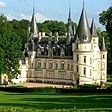BITCHE
CITADEL
Bastion Fortress of Lorraine-Moselle
 The
Citadel fortress of Bitche (Citadelle de Bitche) stands with massive
walls above the small French town of the northern Vosges mountains which
border Germany. The town and the surrounding region Pays de Bitche (pronounced
beesh) take their name from the castle. The high dome promontory with
a view of the surrounding hills of Lorraine on France’s northeast
corner is at once recognizable as a natural commanding site for a defensive
fortress. A castle had stood on the spot above the winding River Horn,
a tributary of the Moselle, since the dark ages, with a medieval castle
from at least 1172, when first mentioned as a castle of the Dukes of
Lorraine (see Castle of the Dukes of Lorraine).
The
Citadel fortress of Bitche (Citadelle de Bitche) stands with massive
walls above the small French town of the northern Vosges mountains which
border Germany. The town and the surrounding region Pays de Bitche (pronounced
beesh) take their name from the castle. The high dome promontory with
a view of the surrounding hills of Lorraine on France’s northeast
corner is at once recognizable as a natural commanding site for a defensive
fortress. A castle had stood on the spot above the winding River Horn,
a tributary of the Moselle, since the dark ages, with a medieval castle
from at least 1172, when first mentioned as a castle of the Dukes of
Lorraine (see Castle of the Dukes of Lorraine).
 The
present form of the Fortress of Bitche is from its reconstruction by
the French under legendary military architect Sebastien Vauban after
its capture during the Thirty Years War in 1624, when the fortress
took
on its a
star bastion fort form in the age of artillery, though in 1697, after
the complete rebuild, the French were forced to abandon the fort with
the signing of the Treaty of Ryswick, returning the region from Louis
XIV to Duke Leopold of Lorraine. On leaving, the French destroyed all
the fortifications and barracks they had just built, leaving pretty much
the bare earthworks and foundations. A secret convention of Treaty of
Meudon in 1736, allowed the French the right to rebuild forts abandoned
earlier. In 1741, the Count de Bombelles, the military governor of Bitche,
was ordered to rebuild the Citadel, reconstruction under Louis XV’s
chief military engineer Cormontaigne lasted until 1754.
The
present form of the Fortress of Bitche is from its reconstruction by
the French under legendary military architect Sebastien Vauban after
its capture during the Thirty Years War in 1624, when the fortress
took
on its a
star bastion fort form in the age of artillery, though in 1697, after
the complete rebuild, the French were forced to abandon the fort with
the signing of the Treaty of Ryswick, returning the region from Louis
XIV to Duke Leopold of Lorraine. On leaving, the French destroyed all
the fortifications and barracks they had just built, leaving pretty much
the bare earthworks and foundations. A secret convention of Treaty of
Meudon in 1736, allowed the French the right to rebuild forts abandoned
earlier. In 1741, the Count de Bombelles, the military governor of Bitche,
was ordered to rebuild the Citadel, reconstruction under Louis XV’s
chief military engineer Cormontaigne lasted until 1754.
 The
fort’s most glorious days in history were during the Franco-Prussian
War of 1870 and 1871 when the Bitche Citadel was besieged by Bavarian
troops for 230 days (see Bavarian
Army Museum). The fortress withstood
the attack, but with the armistice of January 18, 1871, the Moselle
region
was
ceded
to
the German
Empire and a Prussian garrison took possession. Though it had lost much
of its value in the age of larger artillery and mechanized warfare, the
Germans remained until the end of World War I, when Lorraine-Moselle
was returned to France. The Bitche Citadel had seen almost no action
in the first world war and was then incorporated into the Maginot Line
defenses, supplimenting the Simserhof complex two miles away (see Maginot
Line Fort Simserhof). The fort suffered under allied bombing
in late 1944 leading up to battles of the Bulge in the Belgian Ardennes
(see
Battle of the Bulge Museums). German troops occupied the fortress in
World War II until the town and fort were liberated by the U.S. 100th
Infantry in 1945.
The
fort’s most glorious days in history were during the Franco-Prussian
War of 1870 and 1871 when the Bitche Citadel was besieged by Bavarian
troops for 230 days (see Bavarian
Army Museum). The fortress withstood
the attack, but with the armistice of January 18, 1871, the Moselle
region
was
ceded
to
the German
Empire and a Prussian garrison took possession. Though it had lost much
of its value in the age of larger artillery and mechanized warfare, the
Germans remained until the end of World War I, when Lorraine-Moselle
was returned to France. The Bitche Citadel had seen almost no action
in the first world war and was then incorporated into the Maginot Line
defenses, supplimenting the Simserhof complex two miles away (see Maginot
Line Fort Simserhof). The fort suffered under allied bombing
in late 1944 leading up to battles of the Bulge in the Belgian Ardennes
(see
Battle of the Bulge Museums). German troops occupied the fortress in
World War II until the town and fort were liberated by the U.S. 100th
Infantry in 1945.
 Aside
from its amazingly impressive walls, crowning the elongated hilltop,
there is not much left of the buildings of the fortress. Approached up
a long stone drive angling up the back side, the fort is entered through
a tunnel, and its only gate. The history of the fortress is explained
in a film program. The oldest original building left on the site is
the
18th
Century Garrison
Chapel and the only structure visible above the rampart. Inside as some
of the clock bells and stained glass. There are some remaining underground
facilities to tour and the walls can be explored, with vantage points
with a few display cannons overlooking the country side. There is a small
well-done military museum in the former bakery building of the fort,
with a collection of arms and uniforms from the 1870 war period on display
along with interactive audio-visual exhibits of the military history.
Aside
from its amazingly impressive walls, crowning the elongated hilltop,
there is not much left of the buildings of the fortress. Approached up
a long stone drive angling up the back side, the fort is entered through
a tunnel, and its only gate. The history of the fortress is explained
in a film program. The oldest original building left on the site is
the
18th
Century Garrison
Chapel and the only structure visible above the rampart. Inside as some
of the clock bells and stained glass. There are some remaining underground
facilities to tour and the walls can be explored, with vantage points
with a few display cannons overlooking the country side. There is a small
well-done military museum in the former bakery building of the fort,
with a collection of arms and uniforms from the 1870 war period on display
along with interactive audio-visual exhibits of the military history.
Black Knight Medieval Show
During the summer months from May 1 to August 31, a Medieval times horse and chivalry show is performed on the Bitche Citadel grounds, called the Curse of the Black Knight, held on the plateau near the ticket entrance. The shows are presented Wednesday to Friday at 2:30 and Saturday and Sunday at 2:30 pm and 4:30 with a separate admission. A medieval village presenting education and entertainment geared for kids is open from 11 am.
Visiting the Citadelle de Bitche
The Bitche Citadel fortress is open from the last weekend of March to the first weekend of November, 10 am to 4:30 in the spring and fall and until 5:30 in summer. Adult admission for the medieval and touring the site is 10€ and Children are 8€. Just the show is 2 euros less, with additional supplement of 2€ for the Peace Garden on the castle grounds. The Village of Bitche can be reached by rail from Metz or Strasbourg, with the station just below the fort or by car between Haguenau and Sarreguemines. © Bargain Travel Europe
Find best travel deals in Moselle Lorraine on TripAdvisor
Web Info
Citadelle
Bitche
(French)
These articles are copyrighted and the sole property of Bargain Travel Europe and WLPV, LLC. and may not be copied or reprinted without permission.
See Also:
PFAFFENHOFFEN - WWII CROSSROADS

